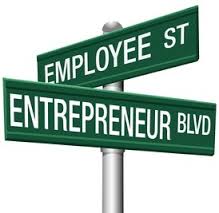
by Dr. Helen Ofosu |
Lately I’ve thought about the challenges faced by newcomers and immigrants to Canada. Part of this is because I participated in a panel discussion at an expo geared towards immigrant women who are interested in creating small businesses.
Becoming an Employee versus an Entrepreneur
In many respects, what a newcomer has done – just to get to Canada – is enormous. The planning and effort that are needed to move to a new country and then starting from scratch upon arrival take a lot of courage. Then, once they’ve arrived, they face many additional challenges. Many immigrant communities know that it can be almost impossible to gain employment that is commensurate with the skills, experience, and credentials that were obtained in another country. This is probably the main reason why so many newcomers decide to focus on self-employment instead of waiting for someone to hire them to do jobs where they are not under-employed.
Self-employment and entrepreneurship can be extremely hard – especially over the first few years. For instance, early stage entrepreneurs may need support around developing suitable business plans, sustainable business models, and growing a professional network. All of these issues can be compounded for newcomers who are still adjusting to the differences between their country of origin and their new country. Plus, there’s a big difference between being excellent in a given profession and being effective at running an actual business. Running a business or being self-employed includes responsibility for marketing, sales, communications, bookkeeping/accounting, and any technical elements (e.g., website, online presence, etc.) — plus providing the core goods and services. Recent immigrants who were entrepreneurs or self-employed in their countries of origin probably have most of these skills.
Why do Some Newcomers Become More Successful than Others?
It’s difficult to determine why some newcomers become very successful in Canada while others don’t fare very well. Anyone who’s taken a taxi in a large Canadian city has probably spoken to a well-informed, overqualified taxi driver. A visit to any Tim Horton’s or WalMart will show you where many immigrants start their Canadian careers despite having earned diplomas or degrees from post-secondary institutions. Stories of foreign trained physicians, lawyers, and other professionals who successfully navigated the steps necessary to obtain a licence to practice in their chosen fields in Canada are much rarer.
It is a strange career trajectory that newcomers can spend 3 to 6 months, or even longer, enrolled in various career planning programs only to end up severely underemployed. I have learned firsthand from newcomers and some people who have provided front-line services to them that part of the problem is that the new immigrants receive bad advice. Often this advice is well-intentioned and free. It’s easy to see the allure of free and well-intentioned career advice but it’s painful to watch the consequences when this free advice proves not to be worthwhile.
One alternative is that newcomers who want better outcomes need to find ways to gain access to better advice. Ideally, this means that they need better access to some of the information that other Canadians have so that they can make better use of their skills and abilities. Of course, when you’re new in a country, that’s easier said than done.
How to Know Which “Professional” Career Advisors to Trust?
Here are some suggestions:
- If you’re a student, try the career services offices on campus
- Read as much as you can from reputable online publications to start to decode or decipher how the Canadian workplace functions
- When possible, make sure that the people you are receiving career-related or business-related advice from have adequate and appropriate training and relevant experience
- Be aware that there is no well-established standard so some coaches have no formal training, and others have less than 1 week of formal training, etc.
- Look for recommendations, reviews, and testimonials to confirm that their previous clients have obtained good outcomes
- Ideally, find advisors who understand the unique challenges that are faced by newcomers and/or members of visible minorities. Canada is a tolerant place but the workplace experiences that newcomers and visible minorities have can be quite different from the experiences of Canadians who have been here longer or are part of the majority group
- Find ways to become better integrated into the broader community. These days, many of the best career opportunities and referral opportunities happen through informal, social and professional networks. When you’re absent from those conversations, you will miss the best opportunities
.About the writer
Dr. Helen Ofosu was born and raised in the Toronto area but her roots are in Jamaica and Ghana. She offers Career Coaching and HR Consulting using her background in Industrial / Organizational Psychology (aka Business Psychology) as the foundation for her practice. She founded I/O Advisory Services in 2012 and is accessible by phone, email, Facebook, and LinkedIn. She can be reached at 613-424-8689 or [email protected]. Web: www.ioadvisory.com.




